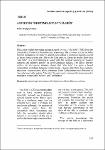Item Infomation
Full metadata record
| DC Field | Value | Language |
|---|---|---|
| dc.contributor.author | Trần Trọng Dương | - |
| dc.date.accessioned | 2025-11-04T03:07:52Z | - |
| dc.date.available | 2025-11-04T03:07:52Z | - |
| dc.date.issued | 2024 | - |
| dc.identifier.uri | http://thuvienso.thanglong.edu.vn//handle/TLU/13507 | - |
| dc.description.abstract | This article studies the origin and meaning of the word "văn hiến" (文獻) from the perspective of historical linguistics and etymology. The surveyed corpus includes modern Vietnamese dictionaries, and Chinese corpus in Confucian classics, as well as Sinitic literary from the 15th to the 19th century. Research results show that "văn hiến" is a Sino-Vietnamese word with the original meaning of "books/ cannons and talented people" in Song Confucian classics. The Sinitic literary written by Vietnamese scholars shows that "văn hiến" has quite a broad connotation, including: language, script, books - classics, literature, law, customs, education - examinations, talent, costumes. Since Confucianism was abolished in the early twentieth century, "văn hiến" has gradually narrowed its meaning and is tending to merge with "culture" and "civilization" | vi |
| dc.language.iso | en | vi |
| dc.publisher | Thang Long Journal of Science: Van hien and Heritage | vi |
| dc.relation.ispartofseries | B3(1);103-121 | - |
| dc.subject | etymology | vi |
| dc.subject | Vietnamese | vi |
| dc.subject | Confucianism | vi |
| dc.subject | Sinitic literacy | vi |
| dc.title | A study on the etymology of "Văn hiến" | vi |
| dc.type | Bài báo/Newspaper | vi |
| dc.identifier.doi | https://science.thanglong.edu.vn/index.php/volb/article/view/196 | - |
| Appears in Collections | Tập B3 số 01 (2024) | |
Files in This Item:



